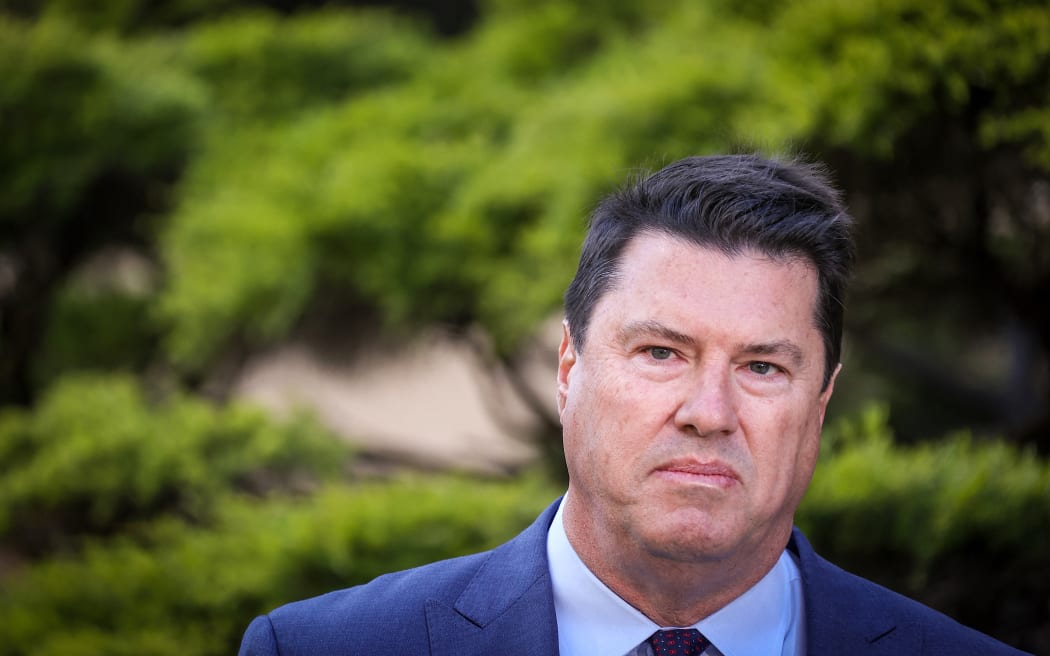
File photo. Rugby Australia chairman Hamish McLennan. Photo: AFP
Opinion - There's a ridge of low pressure causing some bad weather over New Zealand right now, but it's unclear whether it's being caused by some serious hot air coming from across the Tasman.
Specifically, from Rugby Australia and their outspoken chairman Hamish McLennan, who this week called for a draft to be introduced and eligibility to be loosened in Super Rugby Pacific in a bid to spread talent.
McLennan has never been afraid of being a walking headline, which is why it's important to take stuff like this with a hefty handful of salt, but it is at least worth talking about considering one of the most established traditions of any form of Super Rugby is whingeing about how it works. So, can these ideas at least work in some capacity?
It's important first off to understand that you really can't have one without the other. A draft is all well and good but that's just the entry point of what a transfer market is, so it would be imperative that the teams are able to offer more enticing deals within the competition. That's why eligibility barriers between New Zealand and Australia would need to dissolve, then at least a conversation around a much inflated salary cap needs to be had.
Then, the idea of a franchise contract would come into play, which could theoretically be used as a counterbalance for overseas offers to superstar players.
In short, it could signal a move for rugby towards being an actual proper professional sport for the first time in its history. The lack of an internal player market has completely hindered its ability to generate more than the most perfunctory of news coverage, other than when the All Black coaching situation isn't getting completely beaten out of all proportion or if NZ Rugby is embroiled in some other controversy.
So, McLennan's idea is theoretically a good one from a surface-level look anyway. The problems start to arise without too much digging, though.
The most obvious is that it massively favours McLennan's Australian teams. Any of them would be interested in signing most New Zealand players, while it's unlikely the traffic will be going the other way. Then there's the fact that it would need an independent governing body to oversee how it works, something that NZ Rugby and Rugby Australia would need to both agree on (which they haven't been very good at doing lately) and cede power to. Then there's the fact that the market would be dealing with the two countries' sets of labour laws.
A few hurdles, for sure. And while McLennan will be typically bullish, those hurdles are pretty high. But there is one reason for him to be positive, it's that it's already happening - at least in a reduced capacity in the Australian Super W competition.
The Australian women's sides opened their doors to foreign imports this season, and with there being no restrictions on non-Black Ferns to hop over to Australia once Super Rugby Aupiki has finished, that is exactly what a handful did. The Queensland Reds are in this weekend's final against the Fijiana Drua, with Cristo Tofa, Sam Curtis, Di Hiini and Carys Dallinger playing big roles in them getting there.
Dallinger, who played for the Hurricanes Poua in Super Rugby Aupiki, has even garnered the attention of the Wallaroos since it was discovered she is eligible for a gold jersey thanks to her Australian-born father.
It is a massive stretch to compare that amateur women's competition to the picture involving big money All Blacks and Wallabies, but it's a start at least for McLennan and Rugby Australia's plan. But while Dallinger can't be blamed if she decided a career over there is preferable, it does highlight the aforementioned imbalance in the direction of the talent flow, and that's probably the main reason why NZ Rugby won't even think about entertaining any change to the status quo for a while.
Until then, the debate about how to improve Super Rugby will continue in earnest.




